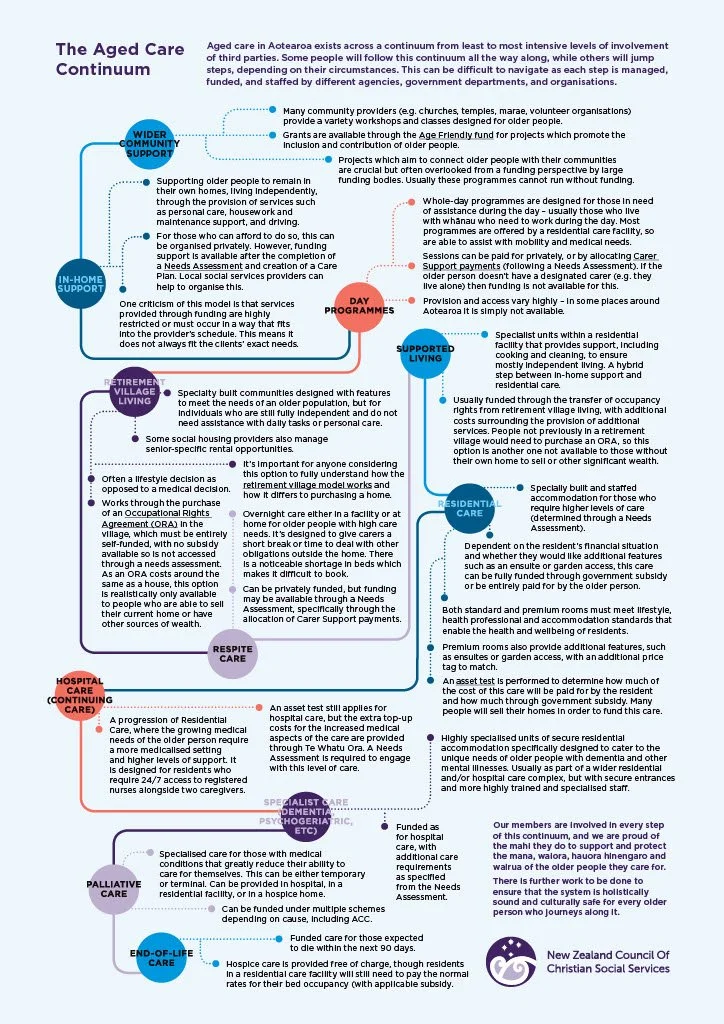Shift needed in housing to support older women
Kaiwhakahaere Matua/Executive Officer of New Zealand Council of Christian Social Services Nikki Hurst believes a structural fundamental shift in how we do housing is essential in Aotearoa New Zealand.
Nikki recently shared her insights during a Coalition to End Women’s Homelessness webinar looking at What works for older women? An evidence-based discussion of findings about older women's needs.
Kaiwhakahaere Matua/Executive Officer of New Zealand Council of Christian Social Services Nikki Hurst. Photo credit: 1News.
The webinar shares research outcomes into the financial, health, and housing needs of older women, and offers the thoughts on how we can adapt policy and practice landscapes to improve housing outcomes for women.
The New Zealand Council of Christian Social Services was formed six decades ago to address issues of poverty felt by older people.
“Our members are some of the very few across the motu who continue to provide no cost, low cost or not-for-profit residential care and aged care services, and we also have a large number of older people come into the social service and community service provider provision,” Nikki explains.
She adds the organisation is currently focused on something it has called “structural agism”, which is “baked into the system” in Aotearoa New Zealand.
With statistics showing in the next 10 years, 25 percent of the population in Aotearoa New Zealand will be over 65, Nikki says there are several actions our country needs to take in order to support older people.
“Housing is the one that comes up the most often from our end…it is not as simple as just a residential care service.
“Older people live in many, many different spaces, and increasingly older people are fighting for spaces to live.”
Nikki and her team are in the process of producing the Aotearoa Aged Care Action Plan, of which housing and access to housing is a crucial part.
“This is a detailed plan we hope to provide to government, to support them, to make better choices, and to start to address this coming wave, of people.
“We know our older women make up about 382,000 New Zealanders of that group and nearly 24 percent do not own their own home.
“Of the 24 percent who don't own their own home, 35 percent are Iwi Māori and 41 percent are Pasifika.”
She adds there is a compounding impact of not owning your own home and existing on superannuation.
“A total of 55 percent of this super would need to be used to cover the average one to two bedroom home rental unit…for a variety of reasons, many women end up being the sole tenant and once that happens, the proportion of their superannuation needed to cover the average rent of a one or two bedroom house across New Zealand is 82 percent.”
As a result, older women are increasingly ending up in emergency housing.
Nikki says sourcing accurate data has proved challenging, with assessment tools such as interRAI only collecting age and gender but not what type of housing people are living in.
Other sources such as the Household Economic Survey and Household Cost Statistics do not collect age or gender information, while the Household Net Worth Statistics collects age and gender, but not in a way that allows us to combine the two categories.
“We are really limited…so what I would say is, if you can't measure it, how on earth can you start to understand and improve it?”
At the conclusion of the webinar, Nikki suggests two key measures to improve housing in Aotearoa New Zealand.
“We think there are some exciting, interesting, and fascinating models out there that lean into the options available under co-housing such as Abbeyfield and a focus on community-based living.
“We also think it is absolutely crucial to measure and report on this pipeline that gets created by a lack of housing because if you do not have a home, you will become unwell and then you can't stay at home.
“So, you get access to age residential care too early, and once a residential care is overfull, we know the flow on will be into our hospitals, and once our hospitals are full, it is going to be challenging for every single one of us.
“We need a structural fundamental shift in how we do housing if we are going to exceed that our values in this country include older people living in rental housing, then we need to build rental housing for older New Zealanders.”
The Aged Care Continuum model.


